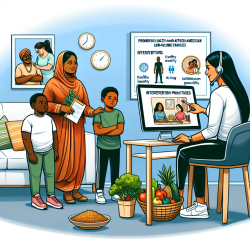Introduction
Childhood obesity is a pressing issue in the United States, particularly among low-income African American families. A recent study titled Stakeholder Perspectives on Barriers for Healthy Living for Low-Income African American Families provides valuable insights into the barriers these families face in pursuing healthy lifestyles. This blog aims to guide practitioners in enhancing their skills by implementing the study's findings or encouraging further research.
Understanding the Barriers
The study utilized qualitative methods, including focus group interviews with African American children identified as overweight or obese and their parents. Key barriers identified included confusion about nutritional information, the challenge of engaging in safe physical activities, and the influence of cultural norms on eating habits.
Parents reported difficulty in understanding what constitutes healthy eating due to conflicting nutritional information. Additionally, the need to balance the nutritional needs of different family members often led to confusion and tension.
Expert Recommendations
Community experts suggested simplifying nutritional messaging and providing practical interventions such as assistance with meal planning and identifying affordable physical activities. They emphasized the importance of culturally sensitive interventions that consider the unique challenges faced by low-income African American families.
Implementing Culturally Sensitive Interventions
Practitioners can enhance their intervention strategies by incorporating the study's findings into their practice. Here are some actionable steps:
- Develop culturally sensitive educational materials that simplify nutritional information and align with the cultural norms of African American families.
- Facilitate community-based programs that involve the entire family, focusing on holistic approaches to healthy living, including stress management and physical activity.
- Collaborate with local organizations, such as churches and community centers, to provide accessible venues for intervention programs.
- Engage families in interactive workshops that include meal planning, cooking demonstrations, and grocery shopping tips.
Encouraging Further Research
While the study provides valuable insights, further research is needed to explore the dynamic interaction between family processes and obesity. Practitioners are encouraged to participate in or support research efforts that aim to develop and evaluate culturally tailored interventions for minority populations.
Conclusion
Addressing childhood obesity in low-income African American families requires a multifaceted approach that considers cultural, familial, and social contexts. By implementing the findings from the study, practitioners can improve their intervention strategies and contribute to better health outcomes for children.
To read the original research paper, please follow this link: Stakeholder Perspectives on Barriers for Healthy Living for Low-Income African American Families.










